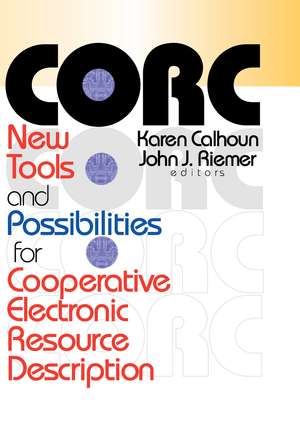Corc: New Tools and Possibilities for Cooperative Electronic Resource Description
Autor John J Riemer, Karen Calhounen Limba Engleză Hardback – 9 mai 2001
The explosion of online resources has brought with it a host of new metadata schemes and cataloging projects. One of OCLC's most important projects is discussed in CORC: New Tools and Possibilities for Cooperative Electronic Resource Description. This fascinating volume on the pioneering collaborative computer system will help you enhance the value of library services and improve the productivity of librarians and library users.
CORC offers a blend of theoretical and practical approaches to broad-based and specialized cataloging problems to help you take advantage of the benefits of the new cooperative cataloging of digital resources. The fourteen chapters in this book tell stories of new ideas, discoveries, and insights gained by being part of the CORC project. The authors represent the perspectives not only of CORC founders, researchers, developers, and observers, but also of library practitioners and managers who are applying CORC to their daily operations.
The discussions of the creation and use of CORC include:
- a big-picture view of CORC from the founder
- CORC's relation to the program for cooperative cataloging
- faceted access to LCSH
- the WordSmith project to obtain subject terminology directly from web documents
- use of online DDC to assist in classification and subject heading assignment
- OCLC's Dublin Core--MARC crosswalk
- librarians’experiences with the implementations of CORC within cataloging and cross-functional teams
- using CORC and Dublin Core to catalog special categories of material: serials, art, and maps
Preț: 411.09 lei
Preț vechi: 521.70 lei
-21% Nou
Puncte Express: 617
Preț estimativ în valută:
78.67€ • 81.51$ • 65.66£
78.67€ • 81.51$ • 65.66£
Comandă specială
Livrare economică 28 februarie-14 martie
Doresc să fiu notificat când acest titlu va fi disponibil:
Se trimite...
Preluare comenzi: 021 569.72.76
Specificații
ISBN-13: 9780789013040
ISBN-10: 0789013045
Pagini: 196
Dimensiuni: 148 x 210 x 20 mm
Greutate: 1.1 kg
Ediția:1
Editura: CRC Press
Colecția CRC Press
ISBN-10: 0789013045
Pagini: 196
Dimensiuni: 148 x 210 x 20 mm
Greutate: 1.1 kg
Ediția:1
Editura: CRC Press
Colecția CRC Press
Public țintă
ProfessionalCuprins
Preface Introduction Collaboration in CORC CORC and the Future of Libraries: Two University Librarians' Perspective A Relationship Between CORC and the PCC: Rationale and Possibilities A Faceted Approach to Subject Data in the Dublin Core Metadata Record Terminology Identification in a Collection of Web Resources Dewey in CORC: Classification in Metadata and Pathfinders Crosswalking Metadata in the OCLC CORC Service Cataloging in CORC: A Work in Progress Utilizing CORC to Develop and Maintain Access to Biomedical Web Sites Never the Twain Shall Meet? Collaboration Between Catalogers and Reference Librarians in the OCLC CORC Project at Brown University CORC and Collaborative Internet Resource Description: A New Partnership for Technical Services, Collection Development and Public Services Dublin Core and Serials Using the Dublin Core to Document Digital Art: A Case Study Using the Dublin Core with CORC to Catalog Digital Images of Maps Index Reference Notes Included
Descriere
CORC: New Tools and Possibilities for Cooperative Electronic Resource Description examines the nuts-and-bolts practical matters of making this cataloging system work in the Internet environment, where information objects are electronic, transient, and numerous. This fascinating volume on the pioneering collaborative computer system offers a blend of theoretical and practical approaches to broad-based and specialized cataloging problems. The authors represent the perspectives not only of CORC founders, researchers, developers, and observers, but also of library practitioners and managers who are applying CORC to their daily operations. This valuable book will also help to define the future of librarianship and information access.
